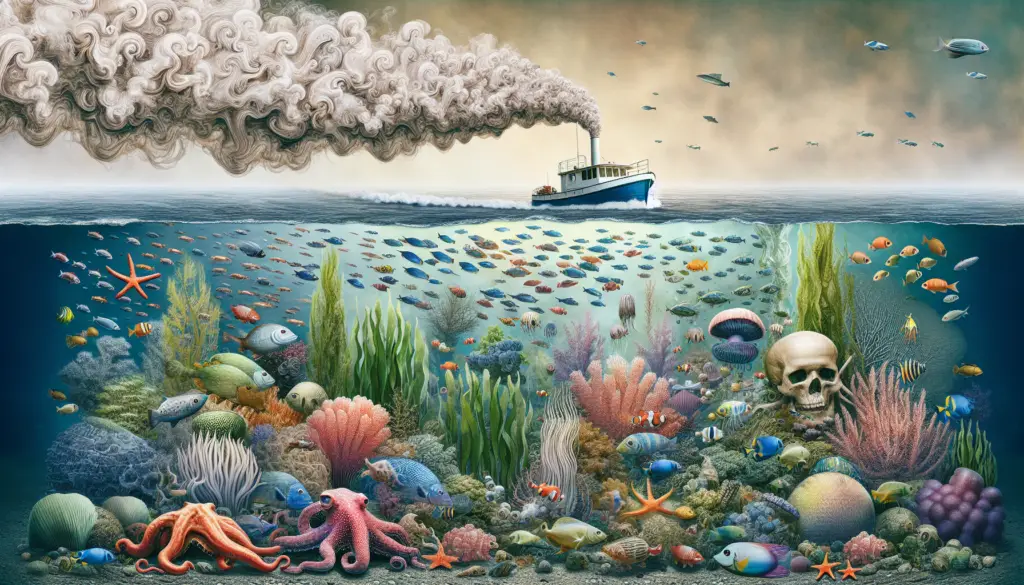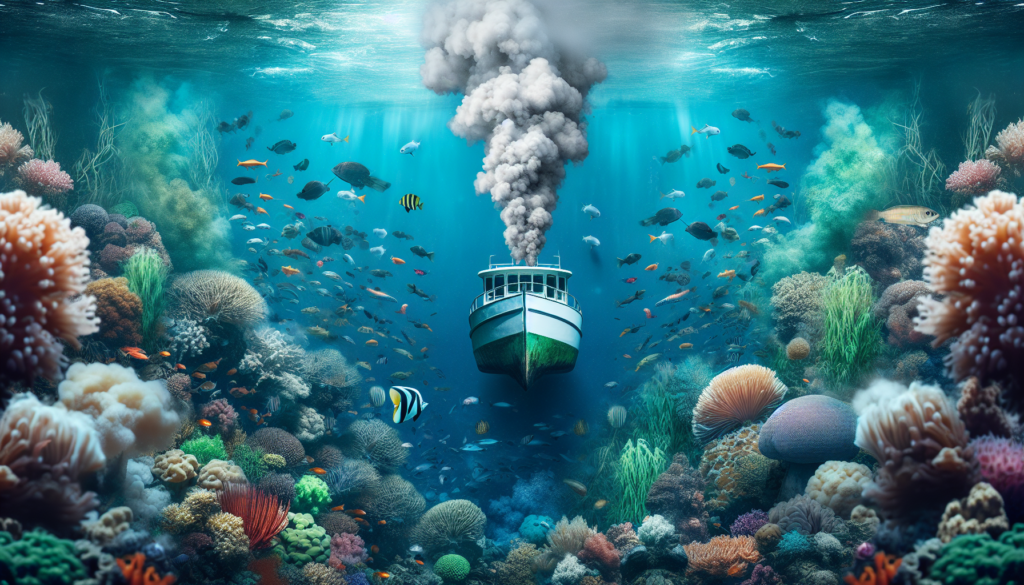You might view cruising on your boat as a harmless leisure activity, but have you ever considered the ecological impact of that beloved boat engine? The article “Understanding The Ecological Impact Of Boat Engine Exhaust” takes you on an insightful journey through the environmental repercussions of your watercraft’s exhaust. It sheds light on the adverse effects of engine byproducts on aquatic ecosystems and offers sustainable alternatives to minimize these effects. Without a hint of guilt-tripping, it arms you with vital knowledge and actionable steps towards boating that respects our shared home-planet. So, come aboard as we chart unexplored waters and commit to more responsible boating practices for the health of our seas.

Components of Boat Engine Exhaust
Understanding the environmental implications of boat engine exhaust starts with recognizing what’s in the exhaust itself. Pollution from boat engines primarily comes in the form of carbon dioxide (CO2), nitrogen oxides (NOx), sulfur oxides (SOx) and particulate matter (PM). These pollutants, originating from the fuel type and combustion process, can have a substantial impact on air and water quality
Identifying key pollutants
While CO2, NOx, SOx, and PM constitute the core pollutants, their impacts vary significantly. Carbon dioxide contributes to global warming, whereas nitrogen and sulfur oxides increase the acidity of water and soil, which can lead to reduced biodiversity. Particulate matter, in contrast, directly affects air quality and, when inhaled, can lead to serious health problems in humans and animals.
Gas vs diesel engines
Both diesel and gasoline boat engines produce harmful emissions, but they differ considerably in their output. Diesel engines produce more PM and NOx than their gasoline counterparts, but generally emit less CO2. Gasoline engines, on the other hand, emit more carbon monoxide (CO) and hydrocarbons (HCs) leading to a different set of environmental and health issues.
Direct Impact on Aquatic Ecosystems
Boat engines, particularly those used in recreational boating, often discharge their exhaust directly into the water, causing various harmful effects.
Effects on water quality
Boat engine exhaust affects water quality in many ways. Increased levels of nitrogen and sulfur in water bodies can lead to acidification, decreasing the pH level of the water and making it inhospitable for various forms of marine life.
Impact on marine life
The pollutants from boat engine exhaust can have severe effects on marine life. Nitrogen and sulfur oxides can lead to the death of fish, while particulate matter can cause suffocation. Precious marine habitats such as coral reefs are also at risk from these pollutants, which can lead to a decrease in overall marine biodiversity.
Changes in aquatic plant life
Not only do pollutants affect aquatic animal life, but they can also cause significant changes in plant life in the water. Nitrogen oxides, for example, can cause nutrient overload, stimulating excessive growth of algae that starves other aquatic plants of sunlight and oxygen.

Indirect Effects on Aquatic Ecosystems
Beyond the direct effects, boat engine exhaust can also indirectly impact aquatic ecosystems.
Disruption of food chains
The pollutants from boat engines can disrupt food chains in the aquatic ecosystem. Altered vegetation can lead to a lack of food for herbivorous marine animals, while increased mortality in fish can affect their predators.
Alteration of reproductive cycles in marine species
The presence of pollutants in the water can alter the reproductive cycles of marine species. Certain chemicals found in boat engine exhaust might mimic hormones, leading to changes in reproductive behaviors and decreased productivity.
Induced algal blooms and their consequences
Nitrogen oxides can lead to eutrophication, promoting excessive algal growth leading to algal blooms. These blooms consume excessive oxygen, thus creating hypoxic or “dead zone” conditions, where most marine life cannot survive.
Impact on Air Quality
Boat engine exhaust also significantly impacts air quality.
Emission of Greenhouse gases
Boats emit substantial amounts of CO2, which gets trapped in the atmosphere and contributes to global warming. As sea transport continues to rise, managing these emissions will be crucial in the fight against climate change.
Air pollution and its effects on human health
Particulate matter and other pollutants from boat engines not only degrade air quality but also impact human health. Long-term or high exposure to these pollutants can lead to respiratory issues, heart disease, and even premature death.
Contribution to smog formation
Nitrogen oxides and volatile organic compounds from boat engine exhaust can react with sunlight to produce ground-level ozone, the primary component of smog. This not only affects visibility but also harms human health and the environment.

Effect on Coastal Ecosystems
Coastal ecosystems, often overlooked, also bear the brunt of boat engine exhaust.
Alteration of coastal vegetation
Pollutants from boat engines can be deposited onto coastal vegetation, altering their growth patterns and reducing their ability to act as natural barriers against coastal erosion.
Impact on coastal wildlife
Increased pollution can greatly affect coastal wildlife. Changes in vegetation can lead to food scarcity for herbivorous animals, while pollutants can directly harm various mammals, birds, and other terrestrial lifeforms.
Cumulative Effects of Boat Engine Exhaust
The cumulative effects of these pollutants raise even larger environmental concerns.
Combination effects of multiple pollutants
Often, multiple pollutants work together to create more harm. For example, SOx and NOx can combine to create acid rain, which damages soils, forests, and aquatic life while also posing various health risks.
Long term impacts on aquatic ecosystems
Over the long term, the constant deposition of pollutants can have drastic effects on aquatic ecosystems. Acidification can alter the species composition in these ecosystems, potentially leading to a collapse of the food chain.
Cascading effects on terrestrial ecosystems
Aquatic and terrestrial ecosystems are deeply interconnected. Alteration in aquatic life can have cascading effects on terrestrial wildlife. For instance, a decline in fish populations can affect bird species that rely on these fish for their diet.

Comparing the Impact of Boat Engine Exhaust to Other Transport Emissions
Boat engine exhaust does not exist in isolation. Comparisons with other transport emissions provide context for its overall environmental impact.
Boat vs car emissions
While the total emissions from boats are lower than those from cars due to fewer numbers, boats emit a higher amount of pollutants per mile of travel. This highlights the need for cleaner boat engines and fuels.
Boat vs airplane emissions
Similarly, although air travel is responsible for more total emissions than boating, the pollutants from boat engines have more direct impact on the environment as they are often released directly into the water or near the ground.
Implications for transport policy
These comparisons shed light on the importance of including boating in transport policy discussions. Efforts should be made to lower the environmental impact of boating along with other forms of transport.
Mitigation Strategies for Reducing Boat Engine Exhaust
There are numerous strategies to mitigate the impact of boat engine exhaust on the environment.
Use of cleaner fuels
Switching to cleaner fuels, such as biofuels or electricity, can significantly reduce the amount of harmful boat engine exhaust.
Engine efficiency and maintenance
Improving the efficiency of boat engines and ensuring their regular maintenance can decrease their fuel consumption and thus reduce their pollutant emissions.
Emerging technologies in boat design and propulsion
Innovations in boat design and propulsion systems, such as hybrid or emission-free electric engines, can drastically lower the environmental impact of boating.
Policy Implications and Recommendations
Policies play a critical role in managing boat engine exhaust and its effects on the environment.
International regulations on boat emissions
While there are international rules for commercial shipping emissions, recreational boating often slips through the cracks. Strengthening and expanding these regulations would help manage the environmental impact of boat engine exhaust on a global scale.
Role of local legislation
Local legislation also plays a crucial role. By implementing stricter emission standards, providing incentives for cleaner boating practices, or creating low-emission zones, local authorities can help combat the issue.
Caring for marine protected areas
Marine protected areas can bear a disproportionate burden from boat engine exhaust. Adopting stricter regulations for these areas can help protect the precious ecosystems they harbor.
Future Perspectives: Cleaner Waters Ahead?
Looking forward, there appears to be a wave of change on the horizon.
Prospects for green boating
With advancements in technology and an increasing understanding of the need for sustainable practices, the prospects for green boating are promising. Cleaner fuels, electric engines, and innovative boat designs are all pathways towards cleaner waters.
Obstacles to achieving cleaner waters
However, obstacles to achieving cleaner waters include the cost of new technologies and the slow pace of policy change. Public resistance and lack of awareness can also hinder progress.
Role of public awareness and education
Raising public awareness and fostering education about the environmental impact of boat engine exhaust are critical. The more people understand the problems and potential solutions, the more they can contribute to change.
In conclusion, boat engine exhaust has a serious impact on the environment from the local to the global scale. While challenges persist, there is hope for a future with cleaner waters. Through smart policies, innovative technologies, and informed public action, we can reduce the ecological impact of boating and help to preserve our invaluable aquatic and coastal ecosystems.

